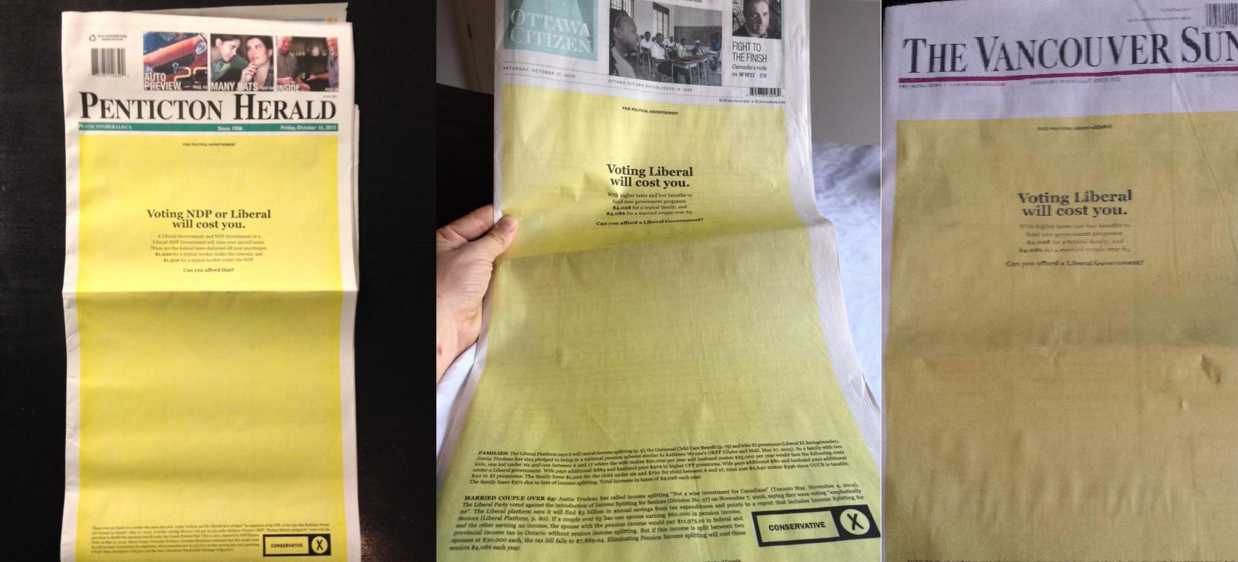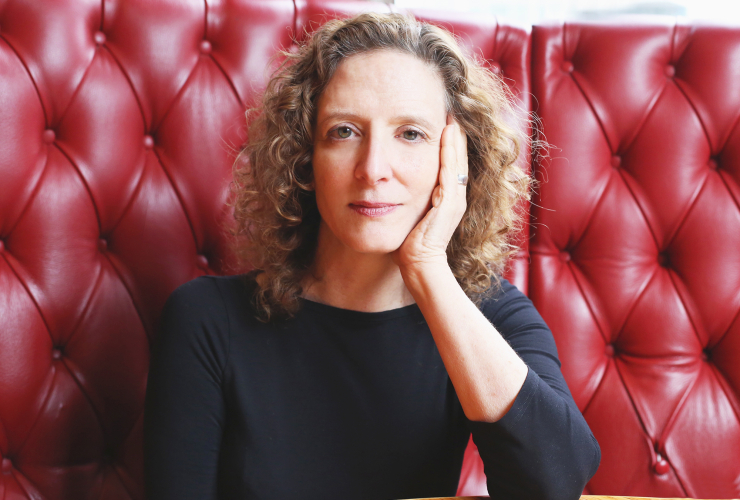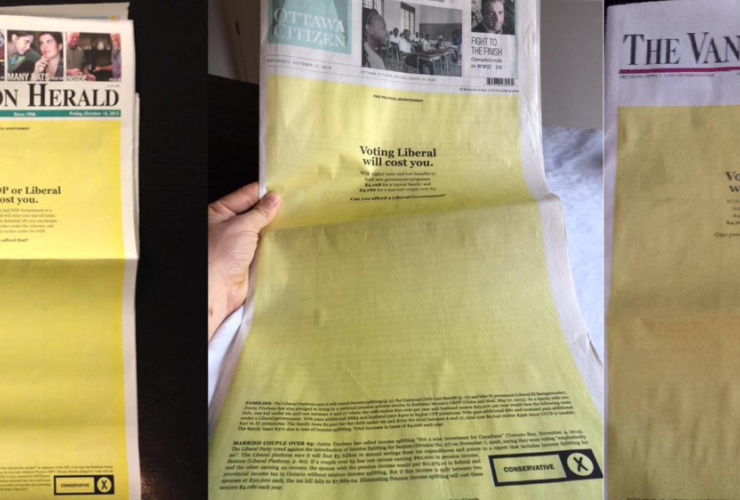Why would anyone pay for something they can get for free?
Would you?
If you'll give me just a couple of minutes, I'd like to see if you'll subscribe here to support investigative journalism in Canada.
It was almost a year ago that I finally saw the impact of media concentration in our country.
In the final days of last year's election campaign, on October 17, 2015, along with all other Canadians, I woke up to newspapers awash in yellow. Postmedia had sold its front page across the country to the Conservative Party. This was after Postmedia CEO and Conservative insider Paul Godfrey ordered that all 16 major Postmedia newspapers endorse Stephen Harper.
The newspapers across Canada that flew the yellow flag of submission included the Ottawa Citizen, National Post, Vancouver Sun and Province, and the Montreal Gazette. At least they got the colour right.
Postmedia had my full attention, because of its apparent close financial ties with the Canadian Association of Petroleum Producers (CAPP). For the past number of years Postmedia had waged an unrelenting war on environmentalist NGOs opposing pipeline expansion.
Those attacks, which silenced and intimidated important voices of dissent, led to a series of Conservative government committee hearings culminating in a $13.4 million CRA audit of charities and non-profits that is still going on today.
As Orwell said, "To see what's in front of one's eyes is a constant struggle," but October 17th it clobbered us over the head. I wrote about it here, in one of the most-read pieces the National Observer has ever published.
On Tuesday, 11 months after that fateful election, the Trudeau government just approved construction of the Pacific Northwest LNG terminal on BC's north coast.
Getting news isn't the problem
Free journalism is available anywhere today. If you want news about Clinton or Trump, the media is an unstoppable gusher.
But what about what's happening where you live?
Can you find out how decisions are really made about the issues in your own community? Do you know who’s funding the campaigns of your elected representatives, who they’re communicating with, and how important government positions are filled?
And what if the same people and companies that pay to get politicians elected also own and control local media? Or national?
Who will hold government's feet to the fire if their biggest supporters own the media?
Getting news isn’t the problem.
The problem is getting the news that matters from sources you can trust.
Because the real grit, the litmus test of a media outlet is the investigative journalism it publishes. That includes the editorial decision about what to publish, like Mike De Souza’s stellar investigative series exposing the National Energy Board’s secret communications with Jean Charest while he was a paid consultant for the Energy East Pipeline. Which the NEB then attempted to cover up.
Mike’s series sparked a firestorm of controversy that forced the dismantling of the Energy East panel. Meanwhile, the entire NEB has fallen under a cloud of suspicion.
Similarly, Bruce Livesey has been covering the extraordinary reach and power of New Brunswick’s industrialist Irving family, which simultaneously owns Irving Oil and all the English newspapers in the province. Coincidentally, Irving Oil stands to benefit enormously from the Energy East.
Here’s the thing. Journalists like Mike De Souza and Bruce Livesey and the other great journalists at the National Observer are rare. This isn’t work that just anyone can do. It takes exceptional talent, professionalism, and guts.
It also takes a media platform that will support that journalism, and then publish its results.
Know what else it takes? It takes groceries, clothes, and a roof over journalists' heads. An office to work in. Shoes for the kids, lessons. You know, a life, and a future.
Journalists need a future, and if you don’t give it to them, either they’ll get it from Irving Oil or CAPP or BC LNG, or just fade away. And then where will you be? Where will Canada be?
It’s the hard reality of media today that the ad revenue model that sustained it for so long has collapsed. The layoffs you’re hearing about are not going to end. This sector’s in crisis. You can thank Facebook and Google, who don’t employ journalists, and by the way don’t pay taxes either.
This crisis makes it essential that the public pay for news. Because if the public won't pay, undisclosed secret interests surely will.
If a news publication doesn’t have a billionaire or major corporate support, the formula is very simple: it needs subscribers.
You know the drill, we need readers like you.
So ask yourself this: What is it worth to you that the National Observer is doing the deep investigative reporting that holds power accountable?
Sure you can get it for free, and hope somebody else makes that happen.
Or, for the price of lunch once a month, you can be the change.
Come on, you know you want to. If you can afford it, you’ve always planned to.
Do it today. Do it right now. Click on this link, and be a subscriber and hero. If you already subscribe, maybe you might consider adding a donation, or perhaps even giving someone you care about the gift of a National Observer subscription. Every dollar counts. And if you would like to subscribe or donate by sending a cheque, our mailing address is: National Observer, 417-207 W. Hastings Street, Vancouver, B.C. V6B 1H7.
It'll make your day. And ours.
As a subscriber to the
As a subscriber to the Penticton Herald, which you display in the article, I wanted to check out the ownership, so I emailed them as well as sending the article to them. I got the reply immediately, that Post Media does not own the Penticton Herald. I suspect, then, that there were also a lot of independent newspapers across Canada that ran that particular ad.







Comments